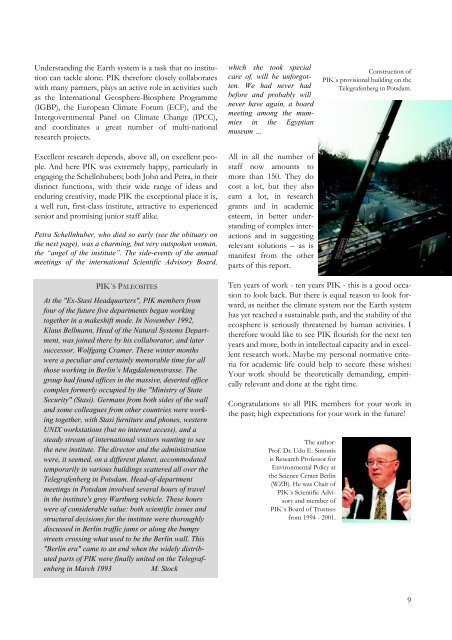PIK Biennial Report 2000-2001 - Potsdam Institute for Climate ...
PIK Biennial Report 2000-2001 - Potsdam Institute for Climate ...
PIK Biennial Report 2000-2001 - Potsdam Institute for Climate ...
You also want an ePaper? Increase the reach of your titles
YUMPU automatically turns print PDFs into web optimized ePapers that Google loves.
Understanding the Earth system is a task that no institution<br />
can tackle alone. <strong>PIK</strong> there<strong>for</strong>e closely collaborates<br />
with many partners, plays an active role in activities such<br />
as the International Geosphere-Biosphere Programme<br />
(IGBP), the European <strong>Climate</strong> Forum (ECF), and the<br />
Intergovernmental Panel on <strong>Climate</strong> Change (IPCC),<br />
and coordinates a great number of multi-national<br />
research projects.<br />
Excellent research depends, above all, on excellent people.<br />
And here <strong>PIK</strong> was extremely happy, particularly in<br />
engaging the Schellnhubers; both John and Petra, in their<br />
distinct functions, with their wide range of ideas and<br />
enduring creativity, made <strong>PIK</strong> the exceptional place it is,<br />
a well run, first-class institute, attractive to experienced<br />
senior and promising junior staff alike.<br />
Petra Schellnhuber, who died so early (see the obituary on<br />
the next page), was a charming, but very outspoken woman,<br />
the “angel of the institute”. The side-events of the annual<br />
meetings of the international Scientific Advisory Board,<br />
<strong>PIK</strong>´S PALEOSITES<br />
At the "Ex-Stasi Headquarters", <strong>PIK</strong> members from<br />
four of the future five departments began working<br />
together in a makeshift mode. In November 1992,<br />
Klaus Bellmann, Head of the Natural Systems Department,<br />
was joined there by his collaborator, and later<br />
successor, Wolfgang Cramer. These winter months<br />
were a peculiar and certainly memorable time <strong>for</strong> all<br />
those working in Berlin’s Magdalenenstrasse. The<br />
group had found offices in the massive, deserted office<br />
complex <strong>for</strong>merly occupied by the "Ministry of State<br />
Security" (Stasi). Germans from both sides of the wall<br />
and some colleagues from other countries were working<br />
together, with Stasi furniture and phones, western<br />
UNIX workstations (but no internet access), and a<br />
steady stream of international visitors wanting to see<br />
the new institute. The director and the administration<br />
were, it seemed, on a different planet, accommodated<br />
temporarily in various buildings scattered all over the<br />
Telegrafenberg in <strong>Potsdam</strong>. Head-of-department<br />
meetings in <strong>Potsdam</strong> involved several hours of travel<br />
in the institute's grey Wartburg vehicle. These hours<br />
were of considerable value: both scientific issues and<br />
structural decisions <strong>for</strong> the institute were thoroughly<br />
discussed in Berlin traffic jams or along the bumpy<br />
streets crossing what used to be the Berlin wall. This<br />
"Berlin era" came to an end when the widely distributed<br />
parts of <strong>PIK</strong> were finally united on the Telegrafenberg<br />
in March 1993 M. Stock<br />
which she took special<br />
care of, will be un<strong>for</strong>gotten.<br />
We had never had<br />
be<strong>for</strong>e and probably will<br />
never have again, a board<br />
meeting among the mummies<br />
in the Egyptian<br />
museum …<br />
All in all the number of<br />
staff now amounts to<br />
more than 150. They do<br />
cost a lot, but they also<br />
earn a lot, in research<br />
grants and in academic<br />
esteem, in better understanding<br />
of complex interactions<br />
and in suggesting<br />
relevant solutions – as is<br />
manifest from the other<br />
parts of this report.<br />
Construction of<br />
<strong>PIK</strong>´s provisional building on the<br />
Telegrafenberg in <strong>Potsdam</strong>.<br />
Ten years of work - ten years <strong>PIK</strong> - this is a good occasion<br />
to look back. But there is equal reason to look <strong>for</strong>ward,<br />
as neither the climate system nor the Earth system<br />
has yet reached a sustainable path, and the stability of the<br />
ecosphere is seriously threatened by human activities. I<br />
there<strong>for</strong>e would like to see <strong>PIK</strong> flourish <strong>for</strong> the next ten<br />
years and more, both in intellectual capacity and in excellent<br />
research work. Maybe my personal normative criteria<br />
<strong>for</strong> academic life could help to secure these wishes:<br />
Your work should be theoretically demanding, empirically<br />
relevant and done at the right time.<br />
Congratulations to all <strong>PIK</strong> members <strong>for</strong> your work in<br />
the past; high expectations <strong>for</strong> your work in the future!<br />
The author:<br />
Prof. Dr. Udo E. Simonis<br />
is Research Professor <strong>for</strong><br />
Environmental Policy at<br />
the Science Center Berlin<br />
(WZB). He was Chair of<br />
<strong>PIK</strong>´s Scientific Advisory<br />
and member of<br />
<strong>PIK</strong>´s Board of Trustees<br />
from 1994 - <strong>2001</strong>.<br />
9

















